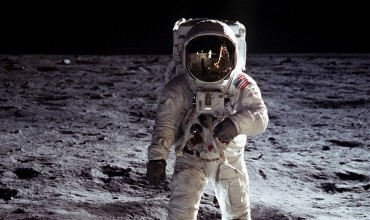Ghosts of Mars
Do you remember that John Carpenter’s movie, Ghosts of Mars? Sure you do, we got to watch Ice Cube coming straight outta Compton, going directly to the Red Planet fighting ancient civilizations of ghost warriors. I guess gangsta rap made him do it. It was an amazing achievement. In fact, it was so amazing that John said: this is it, I’m f**king done and stopped making movies after that one.
On a more serious note, the movie had a decent point about one thing: The plot revolves around the idea that planet Earth will become overpopulated by the year 2025. Which isn’t that far from the truth, allegedly – by the year 2025 the number of people inhabiting Earth will surpass the astonishing figure of 8 billion. And with Elon Musk rushing to get to the Red Planet ASAP, the concept of colonizing Mars by the year 2025 starts looking pretty achievable. All chances are that planet Mars will become our only hope for survival at one point. And Ice Cube is still around, being more gangsta than ever. Spooky.
Before you start packing, let’s prepare ourselves properly for the not-so-friendly conditions of our future home. With Curiosity exploring the terrain, and Elon, among others, investing billions in exploration of this planet, we have a pretty decent picture of what life on Mars will look like.


Get ready for some rough sleepless nights
A team of European scientists from Holland, Germany and the UK’s University of Manchester, conducted an experiment where they observed two separate groups of mice. One group of poor animals had a biological clock (that’s actually a thing believe it or not) of 24 hours, and the other, genetically mutated group of mice, had circadian rhythms of 20 hours. As it turned out, the 24h group lived longer and healthier lives when compared to their poor companions. Scientists observed this phenomenon for a period of 14 months, just to come up with a conclusion:
This would totally happen to us if we were on Mars.
The trick is: one day on Mars lasts 37 minutes longer when compared to our time. Those 37 minutes would mess with our bodies to such an extent, that we wouldn’t be able to function there at all. The conditions would affect our sleep, our mental health, eventually our behavior and finally – our vital functions. And if you believe that you would adapt eventually – you wouldn’t. Most likely NASA would simply revoke your ghetto pass. I mean Mars pass.
Very few of us could actually survive these extreme conditions. This is why the first settlers will have to undergo a challenging training that will test their vital functions in extreme conditions.
Building a concrete house
On average, the human race produces over two billion tons of concrete per year. Concrete has, since its’ discovery, been a material of vital significance for our life on Earth, and all chances are that it will be as equally crucial component in colonizing Mars. However, Mars isn’t that rich on water. So how are we going to build houses on the Red Planet?
A team of researchers from Northwestern actually found a solution. We will simply use materials that we can find on Mars, and produce concrete from soil and molten sulfur. Apparently, that texture is that strong that it could withhold a meteor shower with no problem.

A pricey journey
Mars One, a team on a mission to inhabit Mars and never return, supported by multiple investors and many influential individuals, calculated that the cost of trip Earth to Mars would surpass the figure of $4 billion US.
Mars One is nevertheless still dedicated to reaching Mars by the end of the year 2020. More than 200,000 people applied to join this mission and colonize the Red Planet. Unfortunately, just a handful of them will be selected to become the party of the first settlers. Probably led by Ice Cube.

If I’m a venture capitalist, I would ask you a series of questions, I would say:
- Is it dangerous? Well, yes.
- Will people die? Probably.
- How much will it cost? I don’t know, but a lot.
- What’s my return on investment? Nothing.
But I’m not going to stop them, somebody’s gotta go and do this first you know.
Neil deGrasse Tyson on Mars One mission, source: Business Insider
We are totally not colonizing Mars
According to Lucianne Walkowicz, a stellar astronomer from Nasa who is on a constant search for habitable planets, the idea of colonizing Mars will remain just an idea. Apparently, it is not even a good one. While she does agree that we are not going to survive much longer on this planet, she disputes every suggestion about moving to an obviously inhabitable planet. She insists that we should stop using this planet B plan as an excuse to keep neglecting our own planet.
We totally will colonize Mars
On the other hand, Luis Dill Friedman believes that colonizing Mars is an inevitable mission. This space policy expert is all about life, and he hopes that we will in fact live fruitful lives on the Red Planet. As half-robots.
In his latest book, From Mars to the Stars: The Future of Human Space Flight, Luis suggests that reaching our goal will be achievable with the help of nanotechnology, robotics, a little bit of bio-molecular engineering, and just a dash of an artificial intelligence. The scary thing about Luis is the fact that he considers this mission as inevitable, and even claims that our aspirations will continue to grow in an unimaginable extent. According to him we are not just ready to colonize Mars (which will take us at least a hundred years, FYI) but that we will also visit other planets and even other galaxies with the help of the evolution of technology.
All jokes aside
The gruesome future is indeed inevitable. As we continue to multiply in numbers, with resources draining fast, a planet B will have to come in question sooner or later. People like Elon Musk are simply proactive individuals who are trying to find a solution. Colonizing a different planet is indeed a fairy tale that we would all love to experience, but for some – that might be the very last option. Either that, or we will pack our DNA code inside of a rocket-ship, and send it flying to reach a nurturing soil. A place where our future children could grow unaware of our existence, and unaware of the most important lesson that we failed to learn.
Save the fu**ing planet.
Since we are not prepared to embrace the facts, like the one that we have only 2.5% of fresh water left on this planet. Or the fact that our forests are dying out, at a 0.22% rate annually. Or that our climate is changing rapidly. It seems that we will have to face the music at the end.
I just hope that it won’t be Ice Cube.





